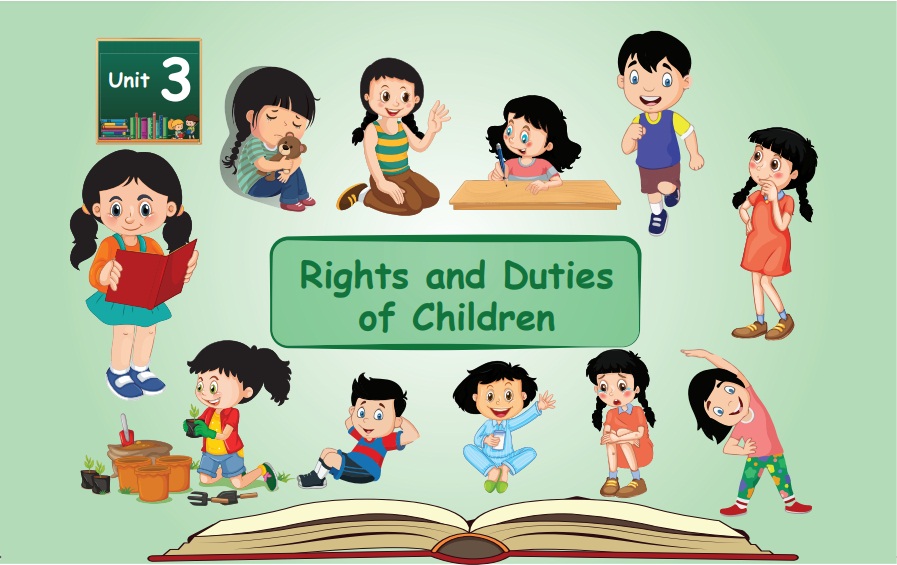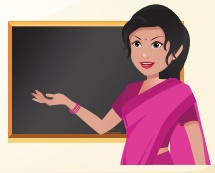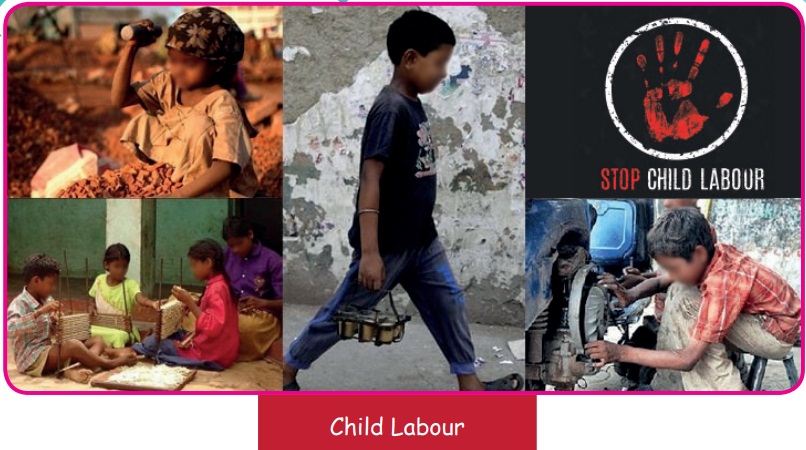Social Science : Term 3 Unit 3 : Rights and Duties of Children
Unit 3
Rights and Duties of Children

Learning Objectives
Children will be able to
• define citizen of a country
• list the rights of children
•describe right to survival
• explain right to development
•give details about right to protection and participation
INTRODUCTION
In school today, Ramesh had an interesting day.
He learnt many rules that he must follow in class.
Let us listen to him talking to his mother about his class.
 Today my class teacher has given us a list of rules that we all have to follow, Amma.
Today my class teacher has given us a list of rules that we all have to follow, Amma.
 That‛s good!
That‛s good!
 We should not change our seats in the middle of the class time in school as it would disturb others. Like this, there are so many rules, Amma!
We should not change our seats in the middle of the class time in school as it would disturb others. Like this, there are so many rules, Amma!
 I think that is very important. Rules are made so that the class can work together properly without disturbing others.
I think that is very important. Rules are made so that the class can work together properly without disturbing others.
 I understand. Our teacher said the same.
I understand. Our teacher said the same.
 Do you know? There are rules that all citizens of the country have to follow.
Do you know? There are rules that all citizens of the country have to follow.
Citizen? What does that mean, Amma?
 Citizen is a person who is a member of a country. A citizen enjoys the rights given him/her by the country.
Citizen is a person who is a member of a country. A citizen enjoys the rights given him/her by the country.
 Ok! Who sets these rules for citizens?
Ok! Who sets these rules for citizens?
Do You Know?
Did you know the number of years it takes for a foreigner to get Indian citizenship?
If a foreigner stays in India for 12 years, they can get Indian citizenship.

•The constitution of India sets these rules.
•The set of rules of a country is known as constitution.
•The constitution lays down certain rules to help the country work together smoothly.
DoYouKnow?
Indian constitution is the lengthiest constitution of the world. The original document was handwritten.
 So that my teacher said if we follow these rules we will become responsible. Does constitution make citizens responsible?
So that my teacher said if we follow these rules we will become responsible. Does constitution make citizens responsible?
 Yes. It helps all people to be a responsible citizen of our country.
Yes. It helps all people to be a responsible citizen of our country.
CHILD RIGHTS
All over the world, there are differentpolicies and rights. Children have certain rights to ensure that every child is treated the same. These are practiced to create a healthy environment for the children to live in. Let us see what Kavya and her father talk about child rights.
 Appa! Do children have any rights?
Appa! Do children have any rights?
 Yes Kavya. All over the world there are many countries which have agreed to make some basic rights for children. Our country is one of them.
Yes Kavya. All over the world there are many countries which have agreed to make some basic rights for children. Our country is one of them.
 Really? Appa, can you tell me more?
Really? Appa, can you tell me more?
 Sure. The four major child rights are:
Sure. The four major child rights are:
1. Right to survival
2. Right to development
3. Right to protection
4. Right to participation
RIGHT TO SURVIVAL
 Appa, can you explain about right to survival?
Appa, can you explain about right to survival?
 It is to ensure every child has access to minimum standards of food. This helps in healthy growth in all children. There are different rights for children below the age of 6 and between the age of 6-14 years. This is because both the age groups have different needs for their growth and development.
It is to ensure every child has access to minimum standards of food. This helps in healthy growth in all children. There are different rights for children below the age of 6 and between the age of 6-14 years. This is because both the age groups have different needs for their growth and development.

 Very interesting. What else is a part of right to survival?
Very interesting. What else is a part of right to survival?
 The WASH programme is also a part of it. Have you heard of it?
The WASH programme is also a part of it. Have you heard of it?
 WASH? Whathappens in that program Appa?
WASH? Whathappens in that program Appa?
 WA S H stands for Water, Sanitation and Hygiene. It means there should be access to clean water for drinking and other needs.There are many diseases that spread through water. To avoid these, having access to safewater is very important.
WA S H stands for Water, Sanitation and Hygiene. It means there should be access to clean water for drinking and other needs.There are many diseases that spread through water. To avoid these, having access to safewater is very important.
 Yes Appa. Even my teacher told us to wash our hands before and after food.
Yes Appa. Even my teacher told us to wash our hands before and after food.
 Very good. Spreading awareness to washing hands with soap is also a part of the WASH programme.
Very good. Spreading awareness to washing hands with soap is also a part of the WASH programme.
 Last week, I saw Muthu who is the child of opposite house, getting some drops of medicine. Is this a part of right to survival, Appa?
Last week, I saw Muthu who is the child of opposite house, getting some drops of medicine. Is this a part of right to survival, Appa?
 Yes, Kavya. That was Polio drops.There are many vaccines and drops which are given to children to protect them from certain diseases.
Yes, Kavya. That was Polio drops.There are many vaccines and drops which are given to children to protect them from certain diseases.
 So nice, Appa.
So nice, Appa.
RIGHT TO DEVELOPMENT
Every child has the right to go to school and develop life skills. Today Vijaya teacher is teaching about right to development.

 Mithra, do you know that coming to school is your right? Do you know that no one can stop you from getting admission in a government school?
Mithra, do you know that coming to school is your right? Do you know that no one can stop you from getting admission in a government school?
 Really? Near my house, I see some childrennot going to school.
Really? Near my house, I see some childrennot going to school.
 Yes, you can see. But, all children below 14 years have the right to go to school. The government is responsible to providing free education to all.
Yes, you can see. But, all children below 14 years have the right to go to school. The government is responsible to providing free education to all.
 Is it so, I will convey this to their parents.
Is it so, I will convey this to their parents.
May be, I can bring them to school tomorrow.
 That’s great, Mithra!
That’s great, Mithra!
Think and Write.
If you see children around you not going to school, what will you do?
Answer:
1. I will go and talk to their parents.
2. I will explain the importance of education.

 What do you see in the picture?
What do you see in the picture?
 Children are involved in different works at different places.
Children are involved in different works at different places.
 This is called Child Labour. It is illegal to force children below the age of 14 to work.
This is called Child Labour. It is illegal to force children below the age of 14 to work.
 Really? What should we do if we see children working as child labour around us?
Really? What should we do if we see children working as child labour around us?
 Call the Childline number 1098 [Ten NineEight] and inform.
Call the Childline number 1098 [Ten NineEight] and inform.
 Okay teacher. Can I call this number at any time? How much does it cost?
Okay teacher. Can I call this number at any time? How much does it cost?
 You can call at any time and it is free ofcost. If you see a child labour, talk to him/her first. If they are forced to do the job, you can call the number and inform. They will come and help the child.
You can call at any time and it is free ofcost. If you see a child labour, talk to him/her first. If they are forced to do the job, you can call the number and inform. They will come and help the child.
Activity
Identify a child in your neighbourhood who is not going to school and fill this questionnaire.
1. Name of the child:Balan
2. Age of the child:7
3. Has the child gone to school ever?: Yes/No
4. Reason for not going to school:Due to poverty
5. How will you guide her / him?: I will explain about free education
Note
The survey can be for parents and the child. In pairs, the children of the class will visit one family or child for an interview. The teacher along with students will discuss the solutions for each case.
RIGHT TO PROTECTION
Children have the right to be protected in all circumstances. Indian government has set laws for the same. Raman and Kavitha’s mother is talking to them about their right to protect themselves. Let us hear their conversation.
 Can you tell me what are the different parts of your body that no one should touch?
Can you tell me what are the different parts of your body that no one should touch?
 Lips, chest and between my legs.
Lips, chest and between my legs.
 Yes! To whom will you say, if someone touches you in these parts?
Yes! To whom will you say, if someone touches you in these parts?
 We will tell to an elder we trust, like you.
We will tell to an elder we trust, like you.
 Will you be scared if someone touches you in any or all of these parts or any other part and make you feel uncomfortable?
Will you be scared if someone touches you in any or all of these parts or any other part and make you feel uncomfortable?
 No Amma. I will not be scared.
No Amma. I will not be scared.
 Yes, and I will shout at the top of my voice for help.
Yes, and I will shout at the top of my voice for help.
 There are laws to punish people who touch children inappropriately. All you need to dois, keep on eye out for danger and be confident.
There are laws to punish people who touch children inappropriately. All you need to dois, keep on eye out for danger and be confident.
 Are there any other rules to protect us?
Are there any other rules to protect us?
 Yes. There is another rule, no person should hit or harm children. It is wrong to hit children, as it affects their well being.
Yes. There is another rule, no person should hit or harm children. It is wrong to hit children, as it affects their well being.
 Really?
Really?
 Yes, all elders should help to create a safe environment for children to live.
Yes, all elders should help to create a safe environment for children to live.
RIGHT TO PARTICIPATE
Children have the right to participate in matters related to them. This includes asking questions, giving suggestions and making decisions in things that affect them. Let us listen to the discussion in Vani teacher’s class.

 Our school is going to be renovated. We need your suggestions to improve the school. Can you all discuss and make a list?
Our school is going to be renovated. We need your suggestions to improve the school. Can you all discuss and make a list?
 Yes, teacher.
Yes, teacher.
(After some time)
 We have the following suggestions for the school:-
We have the following suggestions for the school:-
1. Our school should have toilets at every floor.
2. Drinking water facility for every four classrooms.
3. The sports room needs more carromboards, chess boards, balls and badminton racquets. So that everyone can play.
 Wonderful ideas. I will send this to the headmistress.
Wonderful ideas. I will send this to the headmistress.
 Thank you, teacher.
Thank you, teacher.
 It was great for all of you to participate. Each one of you has the right to expressand share your opinion.
It was great for all of you to participate. Each one of you has the right to expressand share your opinion.
DO YOU KNOW?
Children have the right t oparticipate in discussions and implementation of all things related to them.
Glossary
1. Renovate – to repair and improve something.
2. Survival – the state or fact of continuing to live.
3. Development – the process in which someone or something grows and becomes more advanced.
4. Vaccine – substance that helps to protect against certain diseases.
5. Protect – keep safe from harm or injury.
6. Inappropriately – not correct.
7. Scared – feeling fear.
Recap
• Every citizen of the country can enjoy the rights and do duties.
•Children also have special rights.
•Children have the right to have healthy food for growth and development.
•Children have the right to go to school and have good education.
•Children have the right to be protected against danger.
•Children have the right to participate in the matters related to them.
Evaluation
I. Choose the correct answer.
1. This is against Indian law ____________.
a. Children studying in school.
b. Children below 14 years working in industries.
c. Children participating in school activities.
d. Children getting nutritious food.
Answer: b. Children below 14 years working in industries.
2. Polio drops are given to ____________.
a. men
b. women
c. children
d. senior citizens
Answer: c. children
3. A set of rules of a country is known as the ____________.
a. story book
b. rule book
c. constitution
d. text book
Answer: c. constitution
4. Which of the following is not a right of children?
a. Getting driving license
b. Getting education
c. Getting adequate food
d. Living in a healthy manner
Answer:a. Getting driving license
II. Write true or false.
1. The child has the basic right to get polio drops. (True)
2. There are same rights for all age groups of children. (False)
3. All children of age 6- 14 years should be employed. (False)
4. Hitting children is wrong. (True)
5. Children should be aware of bad touch. (True)
III. Match
1. Childline number – member of a country
2. Vaccines – sanitation
3. WASH – illegal
4. Citizen – protects from diseases
5. Child labour – 1098
Answer:
1. Childline Number – 1098
2. Vaccines – protects from diseases
3. WASH – sanitation
4. Citizen – member of a country
5. Child labour – illegal
IV. Answer the following questions.
1. What are the three parts on your body where no one should touch?
Lips. Chest and between legs are the three places on our body where no one should touch.
2. What are the different rights you have as a child?
1) Right to Survival
2) Right to Development
3) Right to Protection
4) Right to Participation
3. Write short note on right to survival.
Children have the right to have healthy food for growth and development. The WASH programme is also a part of it.
4. Have you ever used your right to participate? Describe.
Yes. During my house renovation, I gave my suggestions for painting work.
5. Why are rights important?
Rights protect people and satisfy their basic needs. So rights are important.
Project
Work in groups of 5 and make a small play focusing on the need of any of the child rights discussed in this lesson.
Think and Write.
If you see children around you not going to school, what will you do?
Answer:
1. I will go and talk to their parents.
2. I will explain the importance of education.
Activity
Identify a child in your neighbourhood who is not going to school and fill this questionnaire.
1. Name of the child:Balan
2. Age of the child:7
3. Has the child gone to school ever?: Yes/No
4. Reason for not going to school:Due to poverty
5. How will you guide her / him?: I will explain about free education














